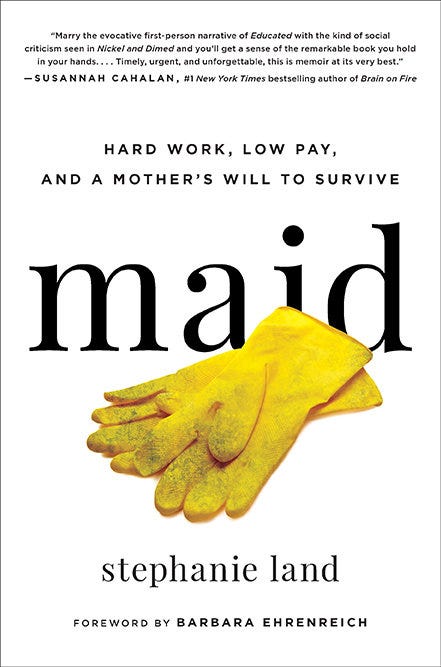We haven’t had a chance to read Stephanie Land’s memoir, Maid, yet, but its full-page review in this past weekend’s New York Times Book Review by Emily Cooke got us plenty excited. Cooke’s opening lines get right to the deep dark heart of domestic work–the work in the home that makes all other work possible.
“I’m not your maid,” goes the outraged refrain of the mother; “I’m not your mother,” the outraged refrain of the girlfriend or wife. The declarations are pleas for respect, consideration; they invoke roles in which women can’t necessarily expect either. What indignities are you subject to when you are both mother and maid?

Stephanie Land’s memoir recounts her years of cleaning homes for $9 an hour in an effort to support herself and her daughter. As one might imagine, $9 an hour without benefits means Land also counted on seven different kinds of government assistance to make her life work:
Rent plus groceries plus utilities plus laundry plus insurance plus gas plus clothing minus an hourly paycheck of barely more than minimum wage and the scant assistance parceled out by the government with spectacular reluctance — the brute poetry of home economics recurs throughout Land’s book.
Hand in Hand members will know that we use $20/hour as a rule of thumb for employers in metropolitan areas, and suggest paying for a minimum of three hours, even if the cleaning takes less time, to account for commuting. But it isn’t only the feeling of being on a very precarious hamster-wheel, or the physical intensity of cleaning work, that makes Land’s work so hard to endure. It’s also that sense of invisibility — and thus worthlessness — that her position as “the maid” confers upon her.
The maid, as Cooke says, is the person you don’t want to be. It’s the person with the worst job, the bottom of the pecking order, according to the woman who doesn’t ever want to be mistaken for one in her own home. Though Land is apparently the best cleaner in her boss’s business, one about whom clients never complain, that does not seem to translate to a an appreciative, warm, or even polite relationship. She says that if she ever hired a cleaner herself one day, “she’d tip them, offer them food, leave them small gifts. She’d treat them “like a guest, not a ghost.”
How painful is that one simple phrase? A guest, not a ghost.
Cooke lays bare why this is such a painful dynamic:
“How well the underclass are forced to know their overseers. This state of affairs is so ordinary, so unremarkable, people hardly mention it. That the poor must grow adept in the customs and quirks of the rich, must attune themselves to their desires and peeves, that this attention is forever and fatally one-sided, is understood merely as the basis for good customer service.”
From our perspective as a network of domestic employers, this seems like an overly-broad brushstroke. We know that while our culture sees anyone who employs someone else as rich, employers come from many economic strata, and that the realities of the working middle class today mean that more and more people outsource work like cleaning or childcare.
When we think of domestic employers as only the callous, oblivious rich, we do ourselves a disservice and hide the truth: everybody needs help, and many people just barely manage to afford the support they need at home. Many more simply go without.
If we could acknowledge this, we could then go one step further and work on the quality of these relationships and the power dynamics that can trip up even the most well-intentioned employer.
As Cooke puts it, that’s probably one of the best reasons to read a book like this: it “reverses the direction of the gaze,” reminding everyone that there is a deep and full humanity on the other side of this employment transaction, one which demands that employers show up for them as much as we employers need them to show up for us.
